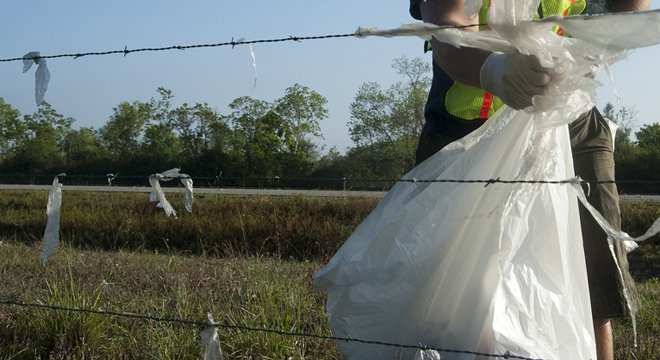A Klu Klux Klan group in Georgia has applied for an Adopt-a-Highway permit, in the hopes of cleaning up a stretch of highway not far from the North Carolina border.
The International Keystone Knights of the KKK filed an application with the Georgia Department of Transportation (DOT) on May 21, asking to take care of mile zero through one of Route 515 in Blairsville. The Georgia DOT website states that “any civic-minded organization, business, individual, family, city, county, state, or federal agency is welcome to volunteer in the Georgia Adopt-A-Highway program.”
DOT officials are meeting on Monday with lawyers from the Georgia Attorney General’s office to go over the application. On the one hand, participation in Georgia’s Adopt-A-Highway program is declining. The Georgia DOT manages 18,000 miles of primary and secondary highways and tollways, spends millions every year cleaning up roadside trash, and needs all the help it can get. On the other hand, the International Keystone Knights of the KKK want to put a sign reading “IKK Realm of the GA Ku Klux Klan” on the side of a state road.
State Rep. Tyrone Brooks (D-Atlanta), head of the Georgia Association of Black Elected Officials, wants that state to reject the application. He considers the group a domestic terrorist group.
“This is about membership building and rebranding their name in a public way,” Brooks told The Atlanta Journal-Constitution. “If the state approves [their application] then they are complicit.”
According to the Journal-Constitution, the state of Missouri lost a “lengthy” legal battle — assisted by the American Civil Liberties Union — after trying to deny a KKK adopt-a-road application.
Harley Hanson, the exalted cyclops of the Georgia group, told TPM in an interview Monday he won’t rule out legal action if his group’s application is turned down.
“We work with the community, we work within the community,” Hanson said. “We try to do charities. You know, anything to help.”
According to Hanson, his group simply wants to pick up trash.
“The stretch of road is up in the mountains, there’s a lot of beautiful streams and scenery, and we just wanted to help keep that one-mile stretch clean,” he said. “It gives our members something to do every other month or so. Get out there and keep the roads clean.”
Asked what he would say to people who would be uncomfortable seeing a KKK sign on a road sign, Hanson said, “I understand that, I do.”
“But it’s just like seeing a sign that says First Baptist Church to an atheist,” he said. “There’s a lot of different groups out there that, you know, you may not support them and you may not like what they do but if they’re out there trying to do something good for the community, I don’t see what the big issue is.”
“It’s just when it comes to the Klan, people want to start jumping to conclusions about it, without actually speaking to the people to find out what the issue is,” he added.
Hanson said that the difference between his group’s application and the Missouri case is that the Missouri group wanted to adopt a road “through a predominantly black neighborhood.” His group, meanwhile, wants to take care of a highway “that you can cross on foot without being hit by a car.”
“We’re not in a neighborhood that would be deemed more offensive,” he said.










